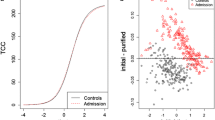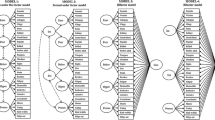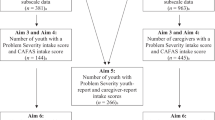Abstract
Informant-related determinants of item attenuation, that is, the drop-off in symptom endorsement rates at retest, were examined in an enriched community subsample of 245 parent–child pairs drawn from the National Institute of Mental Health Methods for Epidemiology of Child and Adolescent Mental Disorders Study. Youngsters and their parents were interviewed with the Diagnostic Interview Schedule for Children (Version 2.3; DISC-2.3) on two occasions with a mean test–retest interval of 12 days. Item attenuation rates were high for both informants, with adults failing to confirm 42% and children 58% of baseline responses at retest. Stepwise regressions revealed that item attenuation at DISC-P retest was higher for adult informants who were younger, and who reported on older and less impaired children. On the DISC-C, attenuation was higher for children who were less impaired, rated as doing worse in school, and who had a longer test–retest interval. These results are broadly consistent with past studies examining the determinants of attenuation and test–retest reliability and have implications for the design and use of structured diagnostic instruments.
Similar content being viewed by others
REFERENCES
Bird, H., Schwab-Stone, M., & Andrews, H. (1996). Global measures of impairment for epidemiological and clinician use with children and adolescents. Journal of Methods in Psychiatric Research, 6, 295-308.
Bird, H., Shaffer, D., Fisher, P., & Gould, M. (1993). The Colombia Impairment Scale (CIS): Pilot findings on a measure of global impairment for children and adolescents. International Journal of Methods in Psychiatric Research, 3, 167-176.
Bumberry, W., Oliver, J. M., & McClure, J. N. (1978). Validation of the Beck Depression Inventory in a university population using psychiatric estimate as the criterion. Journal of Consulting and Clinical Psychology, 46, 150-155.
Edelbrock, C., Costello, A., Dulcan, M., Kalas, R., & Conover, N. (1985). Age differences in the reliability of the psychiatric interview of the child. Child Development, 56, 265-275.
Edelbrock, C., Crnic, K., & Bohnert, A. (1999). Interviewing as communication: An alternative way of administering the Diagnostic Interview Schedule for Children. Journal of Abnormal Child Psychology, 27, 447-453.
Fallon, T., Jr., & Schwab-Stone, M. (1994). Determinants of reliability in psychiatric surveys of children aged 6–12. Journal of Child Psychology and Psychiatry, 35, 1391-1408.
Hodges, K., Cools, J., & McKnew, D. (1989). Test-retest reliability of a clinical research instrument for children: The Child Assessment Schedule. Psychological Assessment: A Journal of Consulting and Clinical Psychology, 4, 317-322.
Jensen, P., Roper, M., Fisher, P., Piacentini, J., Canino, G., Richters, J., Rubio-Stipec, M., Dulcan, M., Goodman, S., Davies, M., Rae, D., Shaffer, D., Bird, H., Lahey, B., & Schwab-Stone, M. (1995). Test-retest reliability of the Diagnostic Interview Schedule for Children (DISC 2.1). Archives of General Psychiatry, 52, 61-71.
Jensen, P. S., Watanabe, H. K., & Richters, J. E. (1999). Who's up first?: Testing for order effects in structured interviews using a counterbalanced experimental design. Journal of Abnormal Child Psychology, 27, 439-445.
Kovacs, M. (1986). The clinical interview. In M. Rutter, C. Izard, & P. Read (Eds.), Depression in young people (pp. 435-468). New York: Guilford Press.
Lahey, B., Flagg, E., Bird, H., Schwab-Stone, M., Canino, G., Dulcan, M., Leaf, P., Davies, M., Brogan, D., Bourdon, K., Horwitz, S., Rubio-Stipec, M., Freeman, D., Lichtman, J., Shaffer, D., Goodman, S., Narrow, W., Weissman, M., Kandel, D., Jensen, P., Richters, J., & Regier, D. (1996). The NIMH Methods for the Epidemiology for Child and Adolescent Mental Disorders (MECA) study: Background and methodolgy. Journal of the American Academy of Child and Adolescent Psychiatry, 35, 855-864.
Loftus, E., Smith, K., Klinger, M., & Fiedler, J. (1994). Memory and mismemory for health events. In J. Tanur (Ed.), Questions about questions (pp. 102-137). New York: Russell Sage Foundation.
Lucas, C. P., Fisher, P., Piacentini, J., Zhang, H., Jensen, P. S., Shaffer, D., Dulcan, M., Schwab-Stone, M., Regier, D., & Canino, G. (1999). Features of interview questions associated with attenuation of symptom reports. Journal of Abnormal Child Psychology, 27, 429-437.
McLeod, J., Turnbull, J., Kessler, R., & Abelson, J. (1990). Sources of discrepancy in the comparison of a lay-administered diagnostic instrument with clinical diagnosis. Psychiatry Research, 31, 145-159.
Milich, R., Roberts, M., Loney, J., & Caputo, J. (1980). Differentiating practice effects and statistical regression on the Conners Hyperkinesis Index. Journal of Abnormal Child Psychology, 8, 549-552.
Roberts, R., Solovitz, B., Chen, Y., & Casat, C. (1996). Retest stability of DSM-III-R diagnoses among adolescents using the Diagnostic Interview Schedule for Children (DISC-2.1C). Journal of Abnormal Child Psychology, 24, 349-361.
Robins, L. N. (1985). Epidemiology: Reflections on testing the validity of psychiatric interviews. Archives of General Psychiatry, 42, 918-924.
Schwab-Stone, M., Fisher, P., Shaffer, D., Piacentini, J., Davies, M., & Gioia, P. (1993). The Diagnostic Interview Schedule for Children—revised version (DISC-R). II. Test-retest reliability. Journal of the American Academy of Child and Adolescent Psychiatry, 32, 651-657.
Schwab-Stone, M., Shaffer, D., Dulcan, M., Jensen, P., Fisher, P., Bird, H., Goodman, S., Lahey, B., Lichtman, J., Canino, G., Rubio-Stipec, M., & Rae, D. (1996). Criterion validity of the NIMH Diagnostic Interview Schedule for Children Version 2.3 (DISC-2.3). Journal of the American Academy of Child and Adolescent Psychiatry, 35, 878-888.
Shaffer, D., Fisher, P., Dulcan, M., Davies, M., Piacentini, J., Schwab-Stone, M., Lahey, B., Bourdon, K., Jensen, P., Bird, H., Canino, G., & Regier, D. (1996). The NIMH Diagnostic Interview Schedule for Children Version 2.3 (DISC-2.3): Description, acceptability, prevalence rates, and performance in the MECA study. Journal of the American Academy of Child and Adolescent Psychiatry, 35, 865-876.
Werry, J., & Sprague, R. (1974). Methlyphenidate in children: Effects of dosage. Australian and New Zealand Journal of Psychiatry, 8, 9-19.
Young, J., O'Brien, J., Gutterman, E., & Cohen, P. (1987). Research on the clinical interview. Journal of the American Academy of Child and Adolescent Psychiatry, 26, 613-620.
Author information
Authors and Affiliations
Rights and permissions
About this article
Cite this article
Piacentini, J., Roper, M., Jensen, P. et al. Informant-Based Determinants of Symptom Attenuation in Structured Child Psychiatric Interviews. J Abnorm Child Psychol 27, 417–428 (1999). https://doi.org/10.1023/A:1021923808118
Issue Date:
DOI: https://doi.org/10.1023/A:1021923808118




